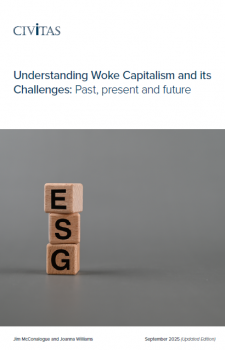Understanding woke capitalism and its challenges: Past, present and future
Jim McConalogue and Joanna Williams, September 2025
Many businesses nowadays engage in what has been coined ‘ethical’, or ‘woke’, capitalism. Whilst ethical capitalism has a long history, over recent decades it has largely fallen under the remit of ‘environmental, social and governance’ (ESG) – an umbrella term that refers to a business’ social commitments, environmental footprint, and level of public accountability – policies and practices.
In Understanding woke capitalism and its challenges: Past, present and future, Jim McConalogue and Joanna Williams examine the focus on ESG’s impact on businesses, workers and consumers.
Companies today struggle to escape ESG principles; gathering, recording and ranking social and environmental data is baked into the way that capitalism is managed and regulated. The authors argue ESG has become so embedded within the capitalist system because for progressive networks and organisations, it provides capitalism with an otherwise unclarified sense of moral purpose. In the meantime, ESG has become embedded within the regulatory bureaucracy of the financial industry. As such, companies can become eligible for inclusion in ethical investment funds by scoring above a threshold on various ESG metrics. There is therefore often a tension between the pursuit of profit and making voluntary concessions to the needs of third parties.
But what do consumers really think? Through an analysis of polling data, Understanding woke capitalism and its challenges finds that, generally, the British public care only somewhat about brands’ positions on social and other issues – while it was clear the more important factors determining consumer purchasing decisions are value for money and convenience.
Employees often encounter the ‘social’ element of ESG through diversity, equity and inclusion (DEI) policies and practices which promote a political notion of ‘social justice’ – such as being required to attend training sessions discussing race, gender and sexuality – regardless of their own views. This, critics say, can infringe workers’ rights and cause employees to be in breach of their own personal values.
ESG produces distinct winners and losers. Some might conclude it is potentially possible for everyone to be satisfied – should there be a greater degree of market segmentation and businesses stick to primarily focusing on appealing to their core customers. The authors warn however that, as an ideological project, it instead seems likely to become more entrenched within capitalism’s regulatory systems – to the detriment of economic growth and individual liberty.
Read Have shoppers had enough of woke branding? by Dr Jim McConalogue.
Read Britain has had enough of woke capitalism by Daniel Dieppe.
Download PDF
